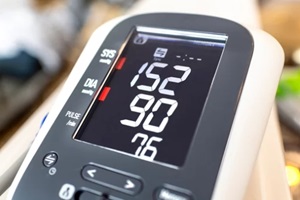 Most people don’t believe they have hypertension, colloquially known as high blood pressure, despite the statistics saying otherwise: over 46% of the U.S. adult population has it. This lack of awareness is understandable since this condition doesn’t present obvious symptoms until a lot of internal damage is done.
Most people don’t believe they have hypertension, colloquially known as high blood pressure, despite the statistics saying otherwise: over 46% of the U.S. adult population has it. This lack of awareness is understandable since this condition doesn’t present obvious symptoms until a lot of internal damage is done.
Getting the facts straight on hypertension is key to making informed choices about prevention and management. This article debunks some common myths to empower you with accurate information.
Myth #1: You’ll Know If You Have High Blood Pressure When You Get Symptoms
High blood pressure is usually asymptomatic at first, meaning it does not cause obvious physical signs in the early stages. Many people have no clue their blood pressure creeps up over months and years from underlying causes, such as excess weight, genetics, lack of exercise, or poor nutrition.
That’s why hypertension has earned the nickname “the silent killer” — it quietly damages arteries and organs without symptoms signaling a problem. Do not assume you’ll know if your blood pressure is elevated or wait for symptoms before getting screened.
Myth #2: Coffee and Caffeine Cause High Blood Pressure
For most healthy adults, typical daily caffeine intake does not chronically raise blood pressure. Coffee, tea, soda, and energy drinks can temporarily cause a faster heart rate and narrowed blood vessels after consuming them. However, these effects generally revert to normal ranges soon after caffeine levels in the blood drop.
Coffee and tea contain antioxidants beneficial for heart health as long as you consume them in moderation without heavy cream, sugars, or syrups. However, if you tend to indulge in more than 400mg daily, it may affect your readings, particularly if you are sensitive to caffeine.
Myth #3: More Men Suffer from High Blood Pressure
Before age 45, hypertension rates are higher in men than women, but this flips after middle age. After reaching menopause, a woman’s risk exceeds that of a man due to declining estrogen levels and other physiological changes.
Birth control pills, pregnancy complications, and menopause can also affect a woman’s blood pressure. Regardless of gender, advancing age also increases hypertension prevalence for all adults because arterial walls naturally stiffen over decades of wear and tear.
Myth #4: Only Massive Weight Loss Will Lower Blood Pressure
Losing even 10-15 pounds can significantly lower elevated blood pressure in those carrying excess weight. This level of weight loss reduces excess strain on the cardiovascular system, so blood flows with less pressure.
 Studies show this degree of weight loss can decrease systolic blood pressure (the top number) by an average of 5-20 mm Hg for most adults. Such drops reduce the risk of heart attack and stroke.
Studies show this degree of weight loss can decrease systolic blood pressure (the top number) by an average of 5-20 mm Hg for most adults. Such drops reduce the risk of heart attack and stroke.
Maintaining long-term weight loss is ideal. But even losing weight for a while and regaining it can still improve your blood pressure for several years before numbers creep up again.
Myth #5: If Your Parents Have Hypertension, You’re Guaranteed to Get It Too
Although family history does increase the risk of developing high blood pressure, it does not guarantee it. Making lifestyle changes through nutrition, physical activity, sleep, and stress relief allows many people with the genetic predisposition to avoid reaching hypertensive levels.
Getting ahead of potential problems early with screening and then addressing any elevated readings promptly, even if still in the high normal ranges, improves your odds of dodging full-blown hypertension down the road. Talk to your doctor about your family history to create a proactive prevention plan tailored to your level of risk.
Myth #6: Blood Pressure Meds Let You Abandon Lifestyle Changes
Medications help control dangerously high hypertension yet do not cure or fix the underlying drivers of rising pressure over months and years. These can be anything from obesity and inactivity to genetics and the stiffening of aging blood vessels.
Drugs can help bring your numbers down, but it’s imperative to adopt nutrition and lifestyle strategies that help manage the root causes. Diet and exercise also improve the effectiveness of your medication.
So, work closely with your physician to create a holistic treatment plan that includes medication, heart-healthy eating, routine activity for aerobic capacity and strength, stress reduction through mindfulness or counseling, adequate nightly sleep, and other positive outlets for promoting well-being.
Myth #7: Once Medication Has Improved Your Blood Pressure, You Can Quit Them Cold Turkey
If you stop taking your hypertension meds abruptly, it can lead to your blood pressure rebounding to higher levels as your blood vessels and heart fall out of sync. Your blood pressure will spike faster without drugs to help regulate your internal balance.
Doctors may slowly wean you off medication, but only after maintaining lower readings for an extended duration with help from lifestyle changes. However, nobody should independently quit medication without medical oversight. Hypertension often requires lifelong treatment and can only be managed and not cured.
Myth #8: Young Adults Don’t Get High Blood Pressure
On the back of growing obesity rates and poorer diets from highly processed foods, more young adults, even teenagers and kids, have to deal with hypertension nowadays. Certain health conditions, such as diabetes or kidney disease, can also trigger early onset.
 As with older demographics, if you go from elevated blood pressure into hypertensive ranges and leave it untreated, you open yourself to the same risks of complications, such as strokes, heart attacks, heart failure, and aneurysms. Early screening and quickly addressing creeping numbers are essential for optimal longevity.
As with older demographics, if you go from elevated blood pressure into hypertensive ranges and leave it untreated, you open yourself to the same risks of complications, such as strokes, heart attacks, heart failure, and aneurysms. Early screening and quickly addressing creeping numbers are essential for optimal longevity.
Lower Your Hypertension Risk Starting Today with Imperial Center Family Medicine
Hypertension left to run amok can seriously impact your quality of life and longevity when complications set in. However, it is highly preventable through simple screenings, nutrition and lifestyle changes, and properly prescribed medication if needed.
Imperial Center Family Medicine’s team of experts is passionate about providing complete cardiovascular care and prevention in Durham, NC. Contact us today at 919-873-4437 or online to schedule an appointment and let our expert healthcare providers help you craft an individualized plan to maintain healthy blood pressure.
